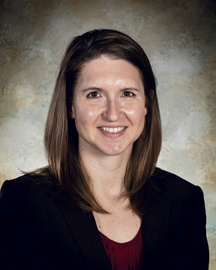BROKEN GLASS
Family Ties
Fifth-generation agency leader works with passion to protect clients
By Elisabeth Boone, CPCU
You’ve just graduated from college and, unlike millions of new grads, you don’t have to put together a string of part-time jobs to keep food on the table until you can land a position in your field. How did you get so lucky?
Sarah Brown knew that upon graduation she could start to learn the insurance business by joining the agency her great-great grandfather established in 1899 and becoming the fifth generation of her family to carry on a proud tradition at Keller-Brown Insurance Services.
She decided to follow a different path and became an underwriter trainee at a company that specialized in providing insurance for truckers. The troubled insurer had difficulty maintaining reserves and ultimately was liquidated by the Pennsylvania Insurance Department.
“I had just gotten my CIC when they started the first round of layoffs,” Brown says. “Being one of the newer hires, I was among the first to be let go.
“That took a lot of wind out of my sails,” she says ruefully. “But I got hired back into the loss control department, which was a new unit, and I worked with the vice president to set up the department. After that I was doing a lot of processing work, and that just wasn’t for me.”
At that time her parents, who were running the agency, had an opening in the personal lines unit and were eager to welcome their daughter into the firm. “I definitely felt the gravitational pull,” Brown says with a laugh. She came on board in May 2008 and knew immediately that she had done the right thing.
“My great-great grandfather, Eli Keller, was a schoolteacher, a banker, and the principal of an agency he cofounded,” she says. “In 1927 my great-grandfather, Harold Keller, took over the agency and ran it while also serving as a county commissioner. My grandfather, Barry Keller, came on board in 1955 and worked in the agency full time; back then it wrote mostly home insurance. My mother, Joy Keller-Brown, took over in 1979 when Harold retired, and my father, Jeff Brown, joined shortly after that.
“My parents really grew the agency,” Brown continues. “My mother, who is highly detail oriented, is in charge of operations, and my father serves as treasurer and as a commercial lines producer. Looking back to 1899, I think each generation in the agency has been a completely different business.”
Keller-Brown now has a staff of 22employees and in addition to personal lines writes a wide range of commercial coverages and bonds as well as offering life, health, and financial planning. The firm is based in Shrewsbury, Pennsylvania, in the southern part of the state near Gettysburg and close to the Maryland state line.

-Sarah Brown, CIC, CRM, AFIS
President and Chief Executive Officer
Keller-Brown Insurance Services
Pride and pressure
How does Brown feel about being the fifth generation of her family to lead the agency?
“I feel a lot of pride, and I also feel a lot of pressure,” she responds. “I don’t want the agency to end with me. That said, I’m always cautious about nepotism. As a company underwriter I saw a lot of that, and it was really a turnoff. I don’t want anyone to think I was given anything just because I’m family; in fact, I’m in the process of purchasing the agency from my parents. Since starting out in personal lines 11 years ago I’ve handled almost every function, so I’ve worked my way up to my current position.”
As noted earlier, while working for the insurer, Brown earned her CIC designation, and her pride in this achievement contributed to a sense of confidence when she joined Keller-Brown.
“I walked in the door thinking ‘I’ve got this; I can handle things if my parents leave,’” she says. “It was pretty humbling when I realized how much I and the agency needed them, and I started praying they would stay.”
Brown, who also serves as a commercial lines producer, says her concept of family extends beyond her blood relatives to encompass the clients she serves.
“My clients are like family,” she says. “Their success is my success. Their hardships affect me too. While I never want to see my clients experience a loss, I know we can take care of them if that time comes. When you have a tragedy, you don’t call a faceless 1-800 number. You call me.”
A woman’s advantage
Having grown up in the 1990s, Brown didn’t experience any of the blatant discrimination against women in the workplace that occurred in the 1960s and ‘70s. That said, she’s sensitive to any hint of bias against women, even when it may appear to be unintentional.
“When I heard one of our guys refer to the women in our office as ‘girls,’ I told him that we don’t hire teenagers to do our work,” she says. “He got the message, and it never happened again.”
In today’s business world, Brown observes, being a woman may actually be an advantage. “Men still dominate in our industry, so at a meeting I’m often the only woman at the table. As a result, I stand out, and that’s been beneficial to me. I have to be knowledgeable and professional, but it helps that I’m in the ‘minority’ in these situations.”
Sometimes she experiences the reverse of discrimination, Brown adds. “When I’m the only woman in the room, some men are overly cautious in how they address me,” she comments. “I know their intentions are good, but it sometimes makes me uncomfortable, and I want to tell them to relax; after all, we’re all just people.”
What unique qualities does Brown think women bring to leadership positions in the insurance industry?
“Without stereotyping, I think women can be more collaborative,” she responds. “People may tend to trust women more, possibly because once someone purchases a policy, the account is likely to be serviced by a woman. The client may see her as caring and trustworthy because, unlike a producer, she isn’t receiving a commission for her work.”
Why don’t more women become producers? Brown harks back to her high school days when, she says, “A girl never asked a guy for a date. You waited to be asked out. And if a girl did ask a guy out and got rejected, she’d probably blame herself and feel like a failure. Even today, I think social forces pressure girls to be passive and boys to be active. That fear of rejection and failure may explain why women are less likely to choose careers in insurance sales.”
Brown acknowledges the debt younger women owe to an older generation of women who courageously fought for equality and dared to challenge a system that consistently denied women the rights and privileges that men took for granted.
“When I think about the women in senior positions who worked in that environment, I have to believe they were strong as well as capable, and that they had to make sacrifices along the way,” Brown remarks. “They had to fight without looking like they were fighting. These women paved the way for successive generations of women to pursue positions of leadership. I’m not breaking a glass ceiling, but I do hope I can make it a bigger one, or at least keep it open for future generations.”
 Attracting young talent
Attracting young talent
We’ve all heard about how, when it comes to trustworthiness, people rank insurance agents along with used car salesmen. That stereotype has faded, and the challenge that agents face today is how to reach out to young people who may know no more about insurance than they hear on TV from Flo, Peyton Manning, or the GEICO gecko.
“Most young people don’t go to school to study insurance,” Brown observes. “All the learning takes place on the job. When they graduate, young people want jobs where they can make an immediate impact. That doesn’t happen in an insurance organization, whether it’s a company or an agency. It takes a long time to learn the business. We recently hired a number of young people, and we tell them they’ll need to spend at least a year learning insurance concepts and terminology, becoming familiar with all of our carriers, and getting up to speed on our automation system. That first year can be painful and frustrating, and it’s a big challenge for young people. In year two they’re more competent and knowledgeable, and by year three we see tremendous progress and accomplishment.”
It’s essential, Brown believes, to persuade young people that their early years of hard work will be richly rewarded in terms of both compensation and the relationships they build with clients and prospects as well as within the community.
“Professionally and financially, the sky’s the limit,” she asserts. “All of us are constantly learning, not just about insurance but about how to improve our sales process and master new technologies. Contrary to popular opinion, insurance is not boring—far from it. Insurance is an old industry, but it’s constantly changing and evolving. It’s a good place to be.”
Do you know a female independent agency leader we should feature? If so, please email details about her as well as contact information to Elisabeth Boone, CPCU, senior features editor (elis.boone@icloud.com). We’ll take it from there.






